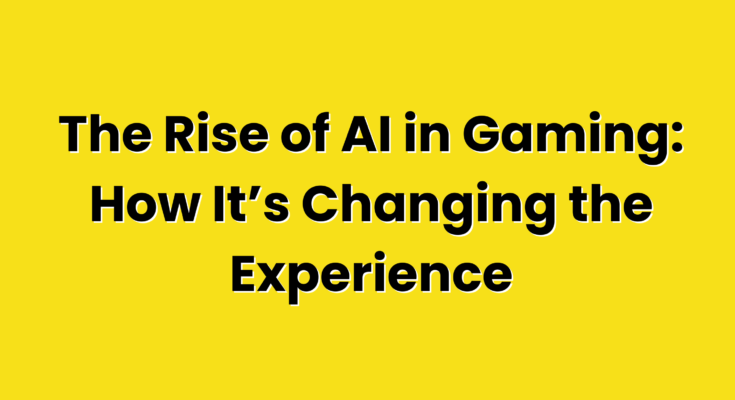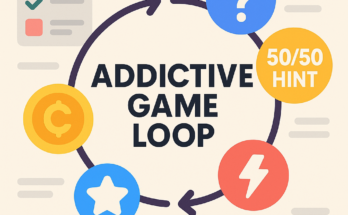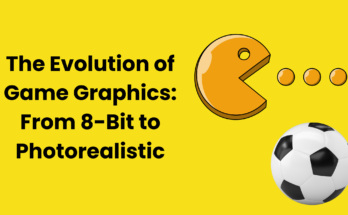Artificial Intelligence (AI) is no longer a futuristic concept — it’s a game-changer in the literal sense. From smarter non-playable characters (NPCs) to personalized in-game experiences, AI is reshaping the gaming landscape like never before. In 2025, we’re witnessing AI’s full potential unfold across game development, gameplay, and even user acquisition.
In this article, we’ll explore how AI is transforming gaming, with real examples, emerging trends, and what it means for developers and players alike.
1. Smarter NPCs and Dynamic Game Worlds
Gone are the days of predictable NPCs following set paths. With AI, game characters learn and adapt to players’ behaviors.
🔹 Real-World Example:
- Middle-Earth: Shadow of Mordor uses a Nemesis System where enemies remember past encounters and evolve.
- Alien: Isolation features an AI-driven alien that stalks the player unpredictably, enhancing fear and immersion.
AI enables:
- Adaptive difficulty levels based on player skill
- Real-time decision making by enemies
- Emergent gameplay, where outcomes differ every time you play
2. Procedural Content Generation
AI can now generate levels, environments, and even storylines without human input, drastically reducing development time.
🔹 Notable Examples:
- Minecraft uses AI-based algorithms for terrain generation.
- No Man’s Sky created an entire galaxy with over 18 quintillion planets using procedural generation.
Benefits for Developers:
- Infinite replayability
- Reduced workload for designers
- Unique user experiences for every player
3. Hyper-Personalized Gaming Experience
AI tailors the game to individual players based on their habits, preferences, and skill level.
Features Enabled by AI:
- Personalized difficulty tuning
- In-game suggestions based on playstyle
- Voice-activated assistants guiding gameplay
Games like FIFA and NBA 2K use machine learning to analyze gameplay patterns, offering smarter matchmaking and more realistic simulations.
4. Realistic Visuals and Behavior with AI
AI is now capable of animating facial expressions, predicting motion, and generating lifelike reactions in real time.
🔹 Trending AI Tools in Game Dev:
- NVIDIA DLSS 3 for upscaling graphics with AI
- AI-generated animations for smooth transitions and lifelike reactions
- Deep learning models to enhance motion capture realism
This means more believable characters, immersive cutscenes, and high-fidelity worlds that feel alive.
5. AI in Game Testing and Bug Detection
Testing games used to be time-consuming and error-prone. Today, AI tools can simulate thousands of playthroughs, spotting bugs and balancing issues fast.
Impact:
- Reduced QA cycles
- Faster go-to-market times
- Enhanced stability across platforms
Tools like Modl.ai and GameDriver are revolutionizing how developers test and debug games.
6. AI-Driven Monetization and User Acquisition
AI is now crucial in targeted advertising, player retention, and monetization strategies.
In Performance Marketing:
- AI analyzes user behavior to segment audiences better
- Predictive analytics determine which users are likely to churn or convert
- Playable ad optimization using machine learning improves click-through rates
Platforms like Unity Ads, AppLovin, and Liftoff use AI extensively for better campaign performance.
7. AI as a Creative Partner
Game studios now use AI for dialogue generation, music composition, and world-building.
Example Tools:
- ChatGPT for interactive storytelling and character dialogue
- Jukedeck and AIVA for AI-composed background music
- Scenario.gg for generating concept art using AI prompts
This means faster prototyping, cheaper production, and more experimentation for indie developers.
The Future of AI in Gaming
As AI continues to evolve, expect:
- Fully AI-generated games
- AI companions that evolve with you over time
- Deeper emotional storytelling powered by neural networks
While ethical concerns and creative debates persist, AI in gaming is clearly enhancing player agency, reducing development friction, and expanding creative possibilities.
Final Thoughts
Artificial Intelligence isn’t just improving gaming — it’s redefining the entire ecosystem. From smarter enemies and endless worlds to real-time personalization and marketing optimization, AI is powering the next era of interactive entertainment.
For gamers, it means richer, more personal experiences.
For developers, it’s the key to faster, smarter, and more scalable game creation.
The game has changed. And AI is the player we didn’t know we needed.
🕹️ Want to Stay Ahead in Game Development?
Follow our blog for updates on AI tools, game dev tips, and monetization strategies that work in 2025 and beyond.
Read about our take on The Most Anticipated Games of 2025: What to Expect?



